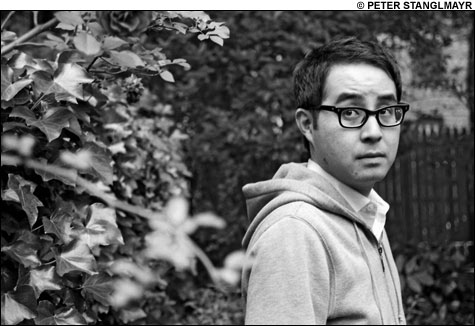
FINE LINES: Always an impressive draftsman, Tomine has hit a new peak in storytelling and characterization. |
I’d never really had a crush on a drawing before. But when I began reading Adrian Tomine several years ago, I started falling for ’em left and right. The sure hand with which he drafts his female characters —limpid, kohl-smudged eyes, button noses, wisps of hair — makes them hard to resist. His black-and-white world is populated by a plethora of indie kids and hipsters: svelte girls with short bobs and barrettes, sensitive guys in Dickies and V-neck sweaters. They’re all rendered in a crisp, clean line style — influenced by predecessors like Daniel Clowes and Los Bros Hernandez and the spare, precise, and dynamic elegance of Japanese manga.As illustrations, they’re gorgeous. But in Shortcomings (Drawn & Quarterly) — his first long-form graphic novel, collected from three recent installments of his long-running comic Optic Nerve — Tomine parlays his skills as a draftsman into fleshed-out characters.
Ben Tanaka, a 30-year-old Bay Area movie-theater manager, sort of looks like Tomine. It’s doubtful that the artist himself is as crabby, cynical, and hyper-critical as his pen-and-ink protagonist. But the two do share some traits. Both have peanut allergies. Both (to judge by Ben’s ceaseless pining and the reams of drawings in Tomine’s 2004 Scrapbook) are rather girl-besotted. And both are Japanese-American men sussing out the tricky emotional and psychosexual undercurrents of that identity.
Ben’s raven-haired girlfriend, Miko, is a stunner: smart and sexy. But while she’s busy programming Asian-American digital-film festivals, he’s distant and aloof, his eye drawn to Autumn, his blonde, tomboyish performance-artist co-worker. This doesn’t escape Miko’s notice — and neither does the fact that the porn actresses in the Sapphic Sorority DVD she confiscates from Ben are all white. When Miko jets off to an internship in New York City, Ben is to left to his own devices in Berkeley. And things get complicated quick. (As they do, his funny, revealing heart-to-hearts with Alice, his lesbian Korean-American friend, are especially rewarding.)
As Ben’s sense of self is thrown into turmoil, Tomine handles the personal-political push-pull with funny, self-depreciating honesty. He also deals smartly with Asian stereotypes. When Ben pretends to be Alice’s date as they visit a gathering of her Korean kin, she snaps: “All Asians might look the same to you, but my family would spot your Japanese ass a mile away.” In another scene (presaging a brutal break-up after a brief fling), Ben, admitting that “stereotypes don’t just materialize out of thin air,” repeats a bad joke: “What’s the main difference between Asian and Caucasian men? The cauc.”
In his early comics (he started drawing Optic Nerve as a teenager in high school), Tomine didn’t draw eyes on his obviously autobiographical character, just a pair of empty-framed glasses. But as he insisted to the Believer this past fall, “I certainly wasn’t consciously hiding my identity.” He did feel faced with a false choice, however, either “to make race a non-issue and deny its impact on life” or “to be like some politically active guy carrying big placards, making giant pronouncements about political issues and injustice.” Lucky for us, he realized there was a more subtle gray territory to be explored on his black-and-white pages. “At a certain point, I realized that it’s not some binary set of options. There’s a lot of area in between to be mined.”